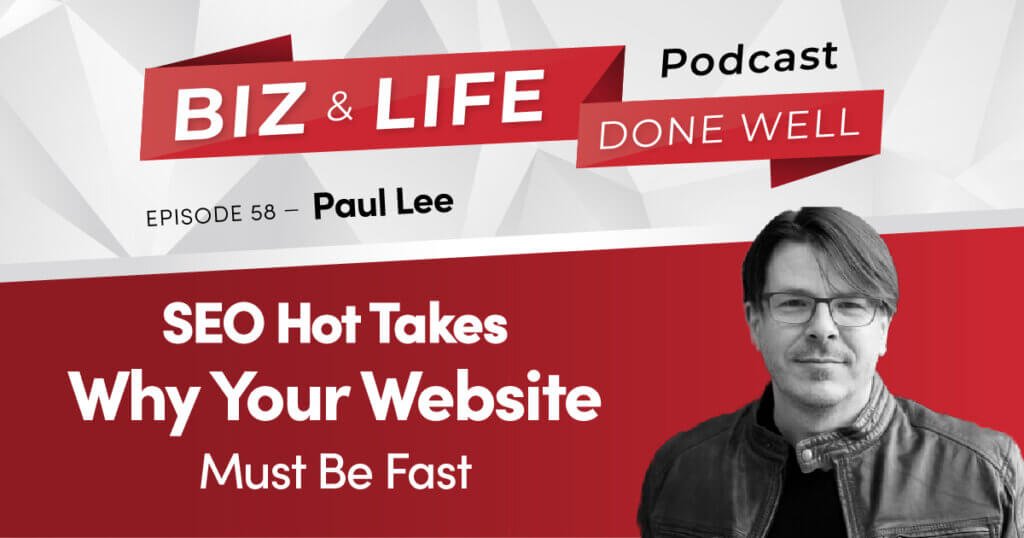Title: SEO Hot Takes – Why Your Website Must Be Fast
Guest: Paul Lee
Peter: Today I’m with Paul Lee. We’re going to talk about the page speed of your website and why that’s important for SEO and why it’s important for the user experience on your website.
Peter: Welcome to the Biz and Life Done Well podcast, where we explore what it means and what it takes to do business and life well. I’m your host, Peter Wilson. If you’re like me, you’re intrigued by stories of common people who have achieved uncommon success in business and life. Join me as I interview fascinating people about how they got started, their successes and failures, their habits and routines, and what inspires them.
Peter: Paul is our SEO expert. He dives really deep in the weeds with SEO. So that’s why we’re going to Paul today. First thing that I’d really like to talk about is this whole notion of page speed. What are we talking about?
Paul: One of the big shifts that’s happened in SEO in the last couple years has been, know Google’s always wanted you know, have your site to function well and all that kind of stuff and it added the definition of that your site has to be fast and over the last few years after initially introducing that as a ranking factor, as something that would affect where you land in that one to 50 spots for various searches, they’ve dialed up the importance of that. So nobody knows the exact algorithm that Google uses. It’s extremely complicated. But we do know from experimentation that page speed matters more and more than it did even a couple of years ago. So there’s become a new emphasis in SEO of not just putting the keywords in the right place.
We still need to do that, not just getting the right kinds of links and, you know, good, good business profile stuff and all that. But now we’ve got this technical aspect to it as well as how fast does your site go? So we’ve ended up kind of morphing into, you know, optimization for speed experts. And that’s been really interesting, but the reason why this has happened.
Peter: Let me cut you off right there real quick. So page speed, just to be clear is how fast the page loads.
Paul: Yes, from the time you press enter or you click to the time you can interact with the page and then the time that the page is fully loaded, which are two different things. You open up a website, you can see the first image maybe, but you can’t scroll any further, then stuff kind of fills in. That you see nothing for like ten seconds and then boom, it all lands in one shot. So Google measures all the little things in between. You know how with the first little slice of information everything else, but what you’re basically wanting to do is get a usable visible page as quickly as possible to the user.
Peter: So the user, so what they’re really talking about is how quickly it actually, the page, a page, a website, a homepage, any page on a website renders for the user so they can use it. And obviously we’ve gone from desktop to mobile. And so rendering on a mobile device because of the speeds and other factors can take longer, right? So.
Paul: Yes, yes. Yeah. And it’s much longer. So they’re two different animals. So you really need to measure on both you know, because not only is it generally desktops are connected to faster networks than, you know, some people driving out in a rural area might be on a slower network, but also the processors inside of phones are less powerful than desktop processors are.
Script like JavaScript and things like that makes
Peter: I’ve also heard that just to geek out for a second here. I’ve also heard, and I don’t know if this is true, that even if you have a web browser on an Apple device like Chrome, it’s still going to use Apple’s rendering engine. And that can slow things down. One of the reasons that I think it’s super important now with respect to SEO is the fact that Google has switched, was it like a year ago, year and a half ago to mobile for a mobile search results is their primary search result to rank SEO?
Paul: Yeah. Yeah. Yeah. And they they so they that means, like, a lot of people, if they test their website for speed, test it on desktop generally, and they miss out on the fact that you can have a site that ranks as an A, you get a good score, everything’s going what seems to be going well on desktop. And then you can look at your mobile numbers and gag.
Peter: Even if you run a website, let’s say you’re a law firm or something, and most people happen to be using desktop for that, you know, to find that type of service, for example, you’re still going to get penalized in the search rankings if you have not optimized for mobile.
Paul: Yes, absolutely. Absolutely. And even in a place like that, you’d be surprised how many people will use an iPad or a tablet or a, you know, a phone or something. Know, so Google’s thinking behind that is that that stuff is just going to grow, you know. And so we want to pay more attention to it because we believe that they believe that it’s going to be more and more of the share of traffic to the site.
Right.
Peter: Yeah. Cool. So, Paul, what is good page speed?
Paul: That’s a really common question because you say, okay, speed matters. So what is a good page speed? What, whatever you’re aiming for, you should be able to interact with the site within three seconds. And that probably is right there caused some people to, you know, to go, uh-oh, because they know their website doesn’t do it in three seconds.
Peter: Or do I have to get out of stopwatch? And good news is you don’t because there’s a bunch of tools that we can use to test it, but.
Paul: Yeah. In fact, we’d talk about more of that at the end, but I definitely, you know, you don’t have to get a stopwatch out. In fact, if you tried that, you wouldn’t get accurate results because obviously you probably have been to your website. You’re when you reload it, it’s reloading out of cache and it’s doing all these other kinds of things so that you would, you know, not necessarily get the same same response that somebody else would get. It’s best to kind of do it from a controlled environment through certain software that emulates the loading of the page.
And then you’ve got apples to apples comparisons. But yeah, three seconds. And that’s a pretty high barrier for a lot of people. That doesn’t mean the site has to be, the page has to be fully loaded, but it has to be interactive and like usable. Usable.
Like three seconds. But yeah, the closer you can get to three seconds for complete as well, the better off you are. On mobile, you’re probably not going to get there. But you get as close as you can. Right.
That’s what you’re looking for.
Peter: Let’s just kind of dissect it a little further in terms of the you, the actual things that could be messing up with the page speed of your website. You’ve got three things. The first thing that you talked about was website hosting.
Paul: Yeah. A lot of people, you know, they go for the budget hosting. They go for something where they they’re comparing and this one has has it for $14 a month and this one has it for $12 a month. So they’re going go with the $12 one. Yeah.
Ouch. You know, I I I get saving money. I and and and, you know, in this economy, you know, as they say, I understand. But I don’t know. That’s a bit like just renting the smallest office space you can possibly get and just cramming everybody in it and saying, well, you know, it’s the budget.
Peter: Getting the smallest air conditioner you can.
Paul: Yeah. Yeah. Everybody just stands closer to it. So a lot of this budget hosting stuff mean you are one website hosted on a computer which hosts thousands of websites. So it is sharing the resources for its of its processor and memory and hard drives and everything else across thousands of websites.
Of course, it’s going to respond a little slower than a machine that is, say, dedicated to it. Now that may be a dedicated machine is too much. It’s overkill. But there are ways to be in between. There are cloud solutions or learning kind of solutions that that that can be much more efficient where you’re actually directing more resources.
A lot of the first thing that happens, so picture you type in the address of your place you want to go, bizmarketing.com, enter. Okay. You hit enter and then there’s an exchange of information. Your browser finds the name and where that goes to, then talks to that server, says, can I have the web page, please? And then the then the server sends the web page back.
So that time that happens between you hit enter and you get the first bite of the web page back is what’s known as time to first bite. So that should be in the two hundred millisecond area. I mean, it’s obviously a slice of a second. So, you know, two hundred milliseconds. That’s what you’re looking for.
But I’ve seen sites commonly where that is one second, one point four seconds. That means literally nothing can happen for that website for one is dead air. And then it starts to load. So that usually is hosting.
Peter: That could even be DNS servers, but
Paul: It could be picking lots of things, but it’s usually that the server on the other end is overloaded.
Peter: Right. So with respect to hosting, I mean, one thing I would talk about quickly here is we host well over 100 sites through our platform and we used to use GoDaddy. We still use them for domain, some domain stuff. We’ve kind of switched to Google domains now. But about a year, a little over a year ago, we switched all of our hosting over to a cloud host called Kinsta, which is just all they do is WordPress.
That’s it. And it’s completely optimized for WordPress. I know you’ve had a little interaction with this as well. The cool thing about Kinsta is that it’s actually a front door gateway to Google Cloud services. So, the sites that we’re hosting are actually hosted in Google’s cloud.
Paul: Okay. Wow. Yeah.
Peter: And that’s, there’s other solutions where you can get hosted in the Amazon Cloud or the Microsoft Cloud. This one just happens to use and it’s optimized for the Google Cloud. So there’s virtually no shared resource blockage at all because the way that they set it up, each site is just its own instance in the cloud and can run you know, as fast as Google can optimize for it. Now we’ve got Google working on our optimization for speed.
Paul: Yeah. And that’s what you need. You need something like that solution. I noticed the difference a year or so ago when we switched to Kinsta, the sites were snappier and rankings rose. Mean, so like we can testify that is a thing, speeding up the site.
And that just by changing hosting. Yeah. And I think that’s something that a lot of people need to consider. That’s like the first step in some people, oh, it’s too difficult. There’s a lot of like, we can make it so you can move the host.
Peter: Right. Exactly. Yeah. Now the next thing on your list is unoptimized images and that has probably been one of the biggest ones that I used to be, I was guilty of that one when I would be putting websites together. I no longer build websites.
I let others that are much smarter and faster than me do it. But let’s talk about that one.
Paul: Yeah, that’s a common one. You’re trying to put together a website, you’re trying to get materials from a photographer or from your, you know, the owner’s phone or something like that, you know, here, put this image up. And so you get it up there and it displays and you feel fine because it’s on your desktop and everything seems to be going fast enough. But what you don’t realize is that you didn’t optimize the image. So the image is actually way too big, you know.
So a phone that takes a picture at thousands of pixels across. Yeah. So you end up with this situation. I just had this today actually with another another client where they were wondering why this one page was very slow and they have several locations and they had a picture next to each location and one of them it was a very small picture actually on the Web page. It maybe was 200 pixels.
Peter: Yeah. So they had sized it on the page to be a certain small size.
Paul: Yeah, exactly. And it was three megabytes.
Peter: The underlying image was three megabytes.
Paul: Yes, it was three megabyte file that was now displaying at 200 pixels across for one of their locations. They’re like, why is this so slow You on know?
Peter: So, one of the things that I’ve noticed also recently with, so it’s, you have to optimize images, meaning there’s compressors you can run images through, there’s resizing, there’s a whole host of tools, right? And that’s something that, when you hire an SEO, that’s what we do as well, Yep. But one of the things that I’ve seen recently is this thing called SVG. That’s a scalable vector graphic that Google is a huge proponent of now. If we can get like of a logo, a scalable vector graphic, they seem to like that much It renders way faster.
Paul: It renders way faster and it can scale to any size. So, you know, so that’s that’s a fantastic format. And then there’s also there’s a whole raft of new image formats coming behind, you know, the classics of GIF and JPEG and Ping to there’s there’s thing called WebP and WebP images are commonly a fifth the size of a very compressed JPEG and that they look the exact same. More and more places are adopting support for WebP. Yeah.
So you’ll start to see new formats even coming up that are even So again, that’s a whole other field. Probably could talk about that for a whole podcast. Right. But image optimizations.
Peter: And your phone, if you took a picture on your phone and said it’s usually going to be what a JPEG or something like that.
Paul: Yeah. It just saves us a JPEG.
Peter: JPG. Okay. So, and then the last one on your list here is lots of JavaScript. Now, most of the folks listening to this podcast are not programmers. So, us just a very dumbed down reader’s digest version of what JavaScript is and how impacts your website.
Paul: Yeah. So JavaScript is a little bit of computer code that can be embedded into your website. So simple JavaScript does things like refresh the page when you click on a certain thing or calculate sizes of things. I mean, just all kinds of things that JavaScript does and it’s meant to be behind the scenes. But the thing about the other thing that it does is it’s used to track people through websites.
So that’s when you say we’re to put the Facebook pixel on you or we’re going to track your activity through Google or whatever. And then people marketing departments, especially in larger companies will be like, let’s do this and let’s try this one. And here’s from Salesforce and here’s from this. And they end up putting all this JavaScript for all these other third party things onto their website. Yeah.
I have seen as many as 50. And so they’re loading 50 resources from 50 different servers every page on their website. And you know, I asked them how many do you actually use? They use in the instance was six. So we were able to get rid of 44 and their pages went much faster.
Peter: Much faster. So it’s generally it’s used to either do something on the page in terms of some animation or something, or it’s used even most typically for tracking code. So dealing with that is a big one. That really is left to the web developers to do. Don’t try to handle that one on your own.
So I think just in wrapping up, want to talk about, so what’s the first step or what’s the next step for folks that are listening? And I think, the first thing that I want to know is how can I find out my page speed? There are tools out there. For example, I don’t know if you want to talk about a couple of them. If you just Google website page speed test, you’ll come up with a few, right?
Paul: Yeah. One of the commonly used is called GTmetrix and that’s with the X at the end GTmetrix. And they have some basic functionality that’s for free. If you have a paid account like we do, then we can get more functionality do some testing. But this also could get complicated.
You’ll see like a flood of information that comes out of you. It gives you a grade and you can see the speed. But if you want to actually figure out why it’s slow or those sorts of things, you might need some more context. So what I would love to do for people and what I think their next step could be is you can do it yourself, you can take a look at it. But I would love to find people that want to find out the speed of their site that are ready to look at that.
Peter: Especially in the context of SEO, obviously.
Paul: Yeah, exactly. Can offer a free
Peter: test. I think what I’ve set up is an email address speedbizmktg dot com. So, if folks send an email to speedbizmktg dot com, I’ll hook you up with Paul and he can run free test for you. And then I think what you’ve offered is to do a video of some sort so you can kind of explain it.
Paul: Yeah, I will walk through the results with you on a video, not like a Zoom call. I’ll record a video and send it to you with some analysis, some things that you might want to look out for, some next steps, red flags, or if it all looks good, I’ll say, I’ll give you a big thumbs up and say, everything looks good. But at least you’ll know. You won’t have to, you won’t be wondering. And we’ll check it on desktop and on mobile too.
Peter: Got it. So we’ll include a link for that in the show notes as well. So that’s really helpful. Paul, thanks a lot for covering this topic. It’s super important.
A lot of folks don’t even think about it when it comes to SEO and the rankings for the website. So thanks for going deep with us on that one and look forward to chatting about SEO and other topics real soon. Thanks.
Paul: All right. Thank you. Appreciate it.
Peter: Thanks for listening to this episode of Biz and Life Done Well with Peter Wilson. You can subscribe to us on iTunes, Google Podcasts, Spotify, and most of the other popular podcast platforms. Please tell your friends about us and leave us a review so even more people will find out about us. Thanks again. We’ll see you soon.



